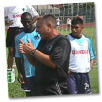The Profession and Jobs
Take a look at the NBA for example. There are teams out there right now looking for a new head strength coach but only offering a $45,000 salary with a prereq of a NASM cert. If this is as good as it gets (becoming a head S/C coach at a pro level) then maybe it's not that good. Why?
Being a slappy for the head trainer of a team who makes over six figures just doesn't seem that appealing.
Again, would love to get Vern's insights in the job opportunity market for those young coaches who want to make a career out of this.
This was posted this morning. I have many strong feeling and reactions about this:
1) One the field is undefined. The fact that they require NASM certification speaks volumes about what is wrong with the field and how undefined it is. If they require NASM certification they don’t get it, so it is probably not a job worth having.
2) You must pay your dues. Start coaching at the high school level. You can make more money there than anywhere, plus you learn the ropes.
3) That being said, do not work for nothing. One internship is all someone needs to do. Interns are now a source of free labor for many people. Once you work for nothing you will always work for nothing. I know that from personal experience. It has taken me 37 years to figure that out.
4) To me salary is commensurate with proven not perceived ability and accomplishments. If you have three years experience, then the salary should reflect that.
5) As far as being under the supervision of the trainer that is our fault for not defining the profession. When I was director of conditioning for the White Sox I was in charge of the Minor League trainers. I hired them and occasionally had to fire them. The end result was great conditioning program that kept players healthy because the trainer had a vested interest in being part of the process instead being on the outside pointing fingers. With the Mets it was the opposite experience, every time I turned around my hands were ties. The results speak for themselves.
6) Certification and education are not the same. Young people today are spending way too much time and money acquiring certifications that are essentially meaningless. Get out and get experience. Go for a week and observe a Jim Radcliffe at University of Oregon or a Chris Doyle at University of Iowa, then you will see what it is all about.
One of my goals for the rest of my career is to help to define this field.


3 Comments:
Couldn't agree with this post more, especially point 6. I know a lot of "trainers” and “conditioning specialists” that have so many letters after their names it ends up looking like a game of Scrabble, yet have very little education.
I have found that all these letters in no way guarantee the amount of practical knowledge on training the individual has.
I look at it as the difference between book smarts (certification) and street smarts (experience). These people may go and take the test required for certification X, but their real world knowledge base is lacking.
The problem with this is that, as we all know, what you learn in the classroom only goes so far in the real world.
Real world interaction with athletes, trail and error and learning from more knowledgeable individuals (Jim Radcliffe for me) will give any trainer/coach more functional knowledge than any test ever will.
I really value the time I spent working with Jim Radcliffe out at Oregon. Gave me a lot of valuable experience. And if I remember correctly, I think he has a MS….no CSCS, ATC, etc.
Thanks for giving props to the high school setting. To young ATC's coming out of college it is an after thought because it lacks the glamor of the college or pro settings. And you're right on target with the salaries.
Does anyone know if you need a college degree to get NASM certified?
Thanks for the post on this topic! A question did come to mind though regarding your bullet point of the White Sox and the Mets.
Why did you join the Mets as their performance coach if your hands were tied? Seems like you would have known this before starting having read your blog.
Hope that's not too personal a question. Just trying to learn from others experiences.
Post a Comment
<< Home